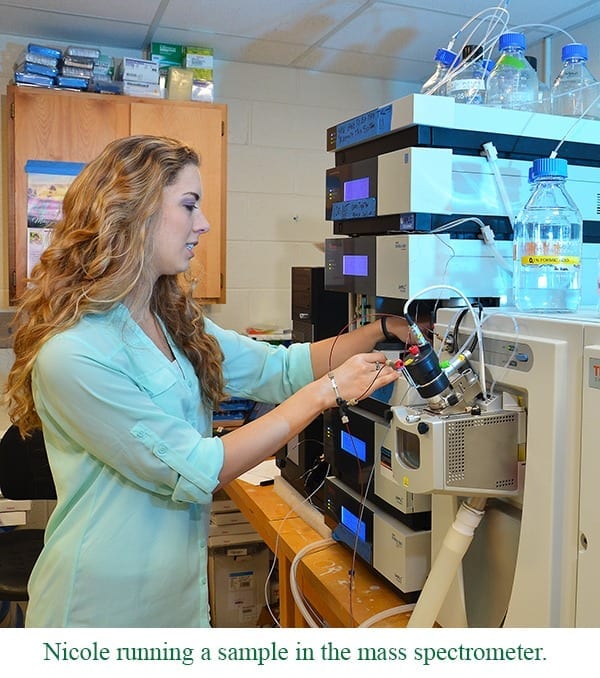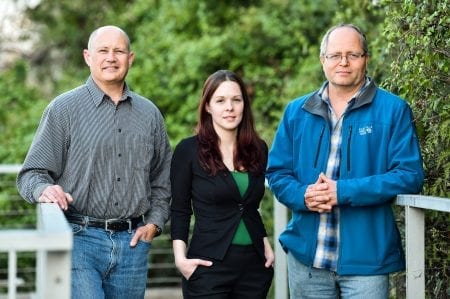
For years scientists have been aware of the potential problems of antibiotics being present in wastewater, and the research of Dr. Olya Keen is now showing that treatments to clean wastewater may actually be creating new antibiotics and further contributing to the development of antibiotic resistance in the environment.
An assistant professor of Civil and Environmental Engineering at UNC Charlotte, Dr. Keen began her current research into the behavior of antibiotics in wastewater in the summer of 2014. She recently presented her initial findings at a conference of the American Chemical Society held in Denver, Colorado.
“This research is a small piece of a larger question,” Dr. Keen said. “There are varieties of antibiotics found in wastewater, and at this point we are just testing one. It is in a class of antibiotics that all have similar compositions, so we anticipate that other antibiotics in this class may respond the same way.”
The antibiotic Dr. Keen and her student are studying is doxycycline, which fall into one of the more widely used classes of antibiotics. Their research to date is showing that chlorine used to treat wastewater is actually changing the makeup of the doxycycline and forming new antibiotics.
“Wastewater treatment is designed to break down biological substances, but not antibiotics,” Keen said. “Surprisingly enough, though, we are finding in the lab that not only is chlorine not breaking down antibiotics, but it is actually creating even stronger antibiotics than the original doxycycline.”
Antibiotics find their way into wastewater in several ways. Antibiotics not broken down by the human body are passed to wastewater, expired antibiotics from homes and hospitals are dumped into wastewater, and there is discharge of antibiotic materials from pharmaceutical companies.
Wastewater tests have found every type of antibiotic known,” Dr. Keen said. “The problems antibiotics cause when they are not broken down by treatment is they get into streams, where bacteria are becoming immune to them, and more dangerous, super bug, bacteria can be formed.”
Read more: Research Shows Wastewater Treatment May be Creating New Antibiotics
The Latest on: Antibiotic resistance in the environment
[google_news title=”” keyword=”Antibiotic resistance in the environment” num_posts=”10″ blurb_length=”0″ show_thumb=”left”]
via Google News
The Latest on: Antibiotic resistance in the environment
- High levels of resistant E coli found in uncooked meat, raw dog foodon April 30, 2024 at 1:31 pm
Uncooked chicken had the highest levels of antibiotic-resistant E coli, with similar levels found in chicken-based raw dog food.
- Targeting skin microbiome rivals: Unveiling epilancin A37's antimicrobial mechanismon April 30, 2024 at 11:02 am
Many bacteria produce substances to gain an advantage over competitors in their highly competitive natural environment.
- Antibacterial Substance From Bacteria Could Provide Alternative to Antibioticson April 30, 2024 at 1:38 am
Many bacteria produce substances to gain an advantage over competitors in their highly competitive natural environment. Researchers at the University Hospital Bonn (UKB), the University of Bonn and ...
- Climate change risks fuelling antibiotic-resistant ‘superbugs’on April 28, 2024 at 5:00 pm
Wastewater is a “reservoir for antibiotic-resistance genes” (ARGs), according to the environmental research journal’s paper. Another proposed cause of the spread of AMR in wastewater is pollution by ...
- Antimicrobial resistance projected to kill 10 million people each yearon April 28, 2024 at 10:45 am
Dr. James Gill addresses antimicrobial resistance and its accelerating crisis, emphasizing the need for patient education.
- A vaccine to combat antibiotic resistanceon April 27, 2024 at 2:00 pm
A team of researchers at Michigan State University have outlined an approach to combating a prevalent public health issue: the development of treatment-res | Technology ...
- CRISPR is promising to tackle antimicrobial resistance, but bacteria can fight backon April 26, 2024 at 3:00 pm
In his presentation "How to use CRISPR-Cas to combat AMR" at the ESCMID Global Congress, Assistant Prof. Ibrahim Bitar, Department of Microbiology, Faculty of Medicine and University Hospital in Plzen ...
- A Vaccine to Fight Antibiotic Resistanceon April 25, 2024 at 2:25 pm
MSU, Harvard Medical School team up to expand vaccine science’s role in the fight against MRSA and other infections ...
- Climate change fuels the rise of global antimicrobial resistanceon April 25, 2024 at 10:34 am
Climate change exacerbates antimicrobial resistance by altering environments where microbes thrive, leading to increased disease spread.
- Climate change is multiplying the threat caused by antimicrobial resistance, researcher warnson April 24, 2024 at 3:10 pm
Climate change is multiplying the threat caused by antimicrobial resistance (AMR), amplifying its growing risk through increasing global temperatures, greenhouse gas emissions and rising sea levels.
via Bing News










